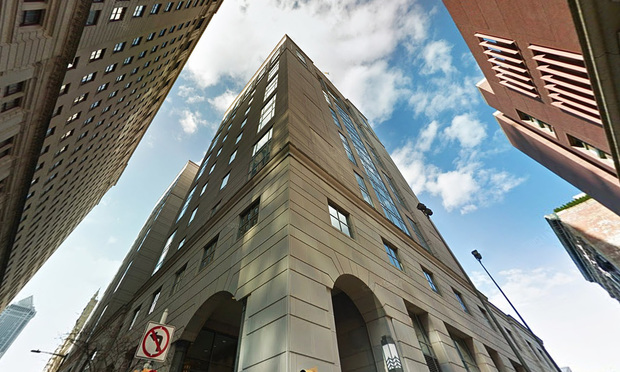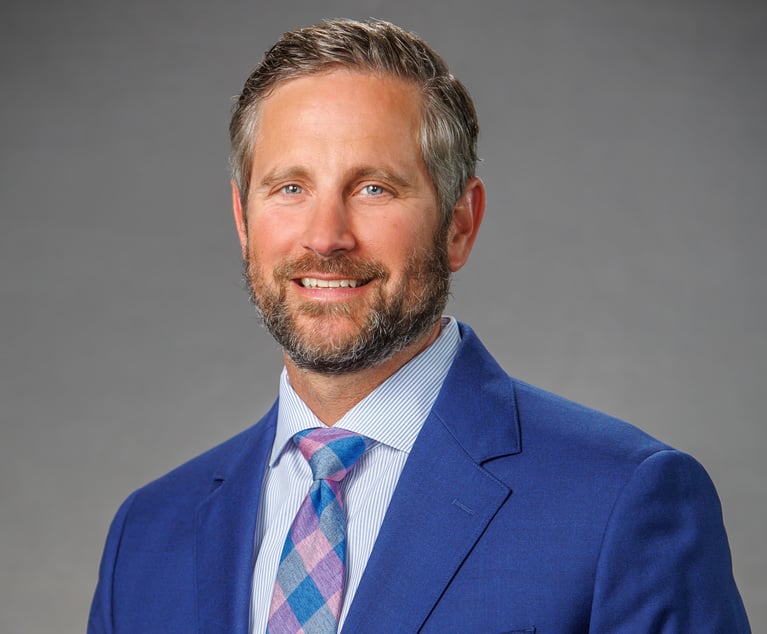Philadelphia Judicial System Closes Criminal Courtrooms as DA Filings Decline
The Legal has learned that, since the beginning of 2018, the First Judicial District has closed seven criminal courtrooms.
March 12, 2019 at 04:05 PM
6 minute read
 Criminal Justice Center in Philadelphia. Photo: Google
Criminal Justice Center in Philadelphia. Photo: Google
When attorneys talk about how the historically bustling Philadelphia Criminal Justice Center has become increasingly quiet over the past year, they often mention the ground floor elevator bank, where attorneys, police and the public all cram together waiting for a ride up through the building to the courtrooms. It can still get crowded, according to attorneys, but not the way it used to.
And, as the First Judicial District has closed several criminal courtrooms over the past year, that growing quiet can now be felt more and more throughout the building, attorneys say.
The Legal has learned that, since the beginning of 2018, the FJD has closed seven criminal courtrooms.
According to court officials, this is due to increased efficiencies on the bench and a decrease in criminal filings that came during the first year of Philadelphia District Attorney Larry Krasner's tenure.
“Efficient case processing and the filing of fewer criminal cases has enabled the Common Pleas leadership to reorganize judicial schedule in order to seat more judges in the Civil Section of the Trial Division, where currently, judicial resources are most needed,” FJD spokesman Gabriel Roberts said in an email.
The rooms, Roberts said, are being used for court business when needed, and will likely be fully staffed once judicial vacancies are filled following the upcoming judicial election cycle.
A spokesman for the District Attorney's Office deferred comment to the court, but said the office was “happy to assist them in any way to increase the efficiency of our criminal justice system.”
A review of court calendars shows that the FJD has been steadily closing courtrooms since the start of 2018.
Records show that, in the first week of 2018, a judge was assigned to every open courtroom. By the end of that month, the FJD listed two rooms as open. The number of rooms staying open grew steadily, and by December five rooms were being left open. Starting in January of this year, the schedule listed seven courtrooms as open.
Along with the courtroom closures, some judges have retired and others have moved into the civil section.
According to the court, Judge Lori Dumas had been in a majors room, which hears complex felony cases, before being reassigned to the civil court in recent moths. Judge Vincent Johnson was in a non-majors room before he was also assigned to the civil section, and Judge Diana Anhalt, who had been hearing homicide cases, is also now hearing civil cases. Judge Gwendolyn Bright has since begun hearing homicide cases.
Senior Judges William Mazzola and Steven Geroff, who also heard homicide cases, have also retired from the bench, according to court officials.
The changes came during a year where the number of criminal cases filed dropped by more than 8,000, or nearly 18 percent, from the more than 46,500 that were filed in 2017. According to statistics obtained by The Legal, the biggest drop came in the misdemeanor category, with 4,647 fewer cases being filed. Nearly 2,500 fewer felonies were also filed in 2018 compared with the year before, and the number of homicide cases during the past year also dropped by 34, from 317 filed in 2017 to 283 in 2018.
Although the numbers indicated a sharp year-to-year decline, it was not the largest drop in filings the office has seen in recent years. Between 2015 and 2016, the court saw nearly 25 percent fewer cases, much of which was due to having more than 12,000 fewer summary offenses filed.
According to the numbers, the biggest dip in the number of homicide cases being filed came between the years 2012 and 2013, when the number fell from 736 to 465.
Along with the decreased filings, the court has also made some changes to how it handles cases. Roberts noted that efforts by the court and its criminal justice partners to expedite the re-sentencings of those given life sentences as juveniles also contributed to the court's ability to reorganize the judicial schedules.
Another very recent change, which began in January, is that floors in the courthouses are no longer geographically zoned, meaning courtrooms on a given floor all hear cases from geographically clustered police precincts.
Attorneys said they have not noticed many changes from a processing perspective, and things continue to run smoothly at the courthouse. However, they said they have noticed changes to the way cases are being prosecuted under Krasner, who was elected on a platform of criminal justice reform. Specifically, along with fewer filings, attorneys said they've noticed that plea offers have been more favorable, more cases going to diversion programs, and cases are being diverted at an earlier stage.
“I would guess that, some of the policies the district attorney is enacting, they are achieving what was desired, in terms of having fewer people in the system,” Mincey Fitzpatrick Ross attorney Kevin Mincey said.
Attorneys also said pleas for violent crimes have not changed, and cases involving sex offenses, robberies or attempted murder seem to still be going to trial at the same rate.
“I'm still busy over there,” Montoya Coleman attorney Joseph Coleman said, adding that, with seemingly more cases being disposed of early on, he was not surprised the court has been able to start closing courtrooms.
Philadelphia attorney Bill Brennan said he has also seen far fewer DUI cases in recent years, but he said that likely has to do with the impact of ride-sharing companies, like Uber and Lyft, rather than any prosecutorial policies.
But, taken together, attorneys said, the courthouse has become much more quiet.
“The place is a ghost town. There are a lot of echoes in the building these days, where before it was standing-room only,” Brennan said, adding, in jest, “Selfishly, I'm going to have to start working at Wawa two nights a week pumping gas if this keeps up.”
This content has been archived. It is available through our partners, LexisNexis® and Bloomberg Law.
To view this content, please continue to their sites.
Not a Lexis Subscriber?
Subscribe Now
Not a Bloomberg Law Subscriber?
Subscribe Now
NOT FOR REPRINT
© 2025 ALM Global, LLC, All Rights Reserved. Request academic re-use from www.copyright.com. All other uses, submit a request to [email protected]. For more information visit Asset & Logo Licensing.
You Might Like
View All

Products Liability: The Absence of Other Similar Claims—a Defense or a Misleading Effort to Sway a Jury?

Trending Stories
- 1Public Notices/Calendars
- 2Monday Newspaper
- 3Judicial Ethics Opinion 24-98
- 4'It's Not Going to Be Pretty': PayPal, Capital One Face Novel Class Actions Over 'Poaching' Commissions Owed Influencers
- 511th Circuit Rejects Trump's Emergency Request as DOJ Prepares to Release Special Counsel's Final Report
Who Got The Work
Michael G. Bongiorno, Andrew Scott Dulberg and Elizabeth E. Driscoll from Wilmer Cutler Pickering Hale and Dorr have stepped in to represent Symbotic Inc., an A.I.-enabled technology platform that focuses on increasing supply chain efficiency, and other defendants in a pending shareholder derivative lawsuit. The case, filed Oct. 2 in Massachusetts District Court by the Brown Law Firm on behalf of Stephen Austen, accuses certain officers and directors of misleading investors in regard to Symbotic's potential for margin growth by failing to disclose that the company was not equipped to timely deploy its systems or manage expenses through project delays. The case, assigned to U.S. District Judge Nathaniel M. Gorton, is 1:24-cv-12522, Austen v. Cohen et al.
Who Got The Work
Edmund Polubinski and Marie Killmond of Davis Polk & Wardwell have entered appearances for data platform software development company MongoDB and other defendants in a pending shareholder derivative lawsuit. The action, filed Oct. 7 in New York Southern District Court by the Brown Law Firm, accuses the company's directors and/or officers of falsely expressing confidence in the company’s restructuring of its sales incentive plan and downplaying the severity of decreases in its upfront commitments. The case is 1:24-cv-07594, Roy v. Ittycheria et al.
Who Got The Work
Amy O. Bruchs and Kurt F. Ellison of Michael Best & Friedrich have entered appearances for Epic Systems Corp. in a pending employment discrimination lawsuit. The suit was filed Sept. 7 in Wisconsin Western District Court by Levine Eisberner LLC and Siri & Glimstad on behalf of a project manager who claims that he was wrongfully terminated after applying for a religious exemption to the defendant's COVID-19 vaccine mandate. The case, assigned to U.S. Magistrate Judge Anita Marie Boor, is 3:24-cv-00630, Secker, Nathan v. Epic Systems Corporation.
Who Got The Work
David X. Sullivan, Thomas J. Finn and Gregory A. Hall from McCarter & English have entered appearances for Sunrun Installation Services in a pending civil rights lawsuit. The complaint was filed Sept. 4 in Connecticut District Court by attorney Robert M. Berke on behalf of former employee George Edward Steins, who was arrested and charged with employing an unregistered home improvement salesperson. The complaint alleges that had Sunrun informed the Connecticut Department of Consumer Protection that the plaintiff's employment had ended in 2017 and that he no longer held Sunrun's home improvement contractor license, he would not have been hit with charges, which were dismissed in May 2024. The case, assigned to U.S. District Judge Jeffrey A. Meyer, is 3:24-cv-01423, Steins v. Sunrun, Inc. et al.
Who Got The Work
Greenberg Traurig shareholder Joshua L. Raskin has entered an appearance for boohoo.com UK Ltd. in a pending patent infringement lawsuit. The suit, filed Sept. 3 in Texas Eastern District Court by Rozier Hardt McDonough on behalf of Alto Dynamics, asserts five patents related to an online shopping platform. The case, assigned to U.S. District Judge Rodney Gilstrap, is 2:24-cv-00719, Alto Dynamics, LLC v. boohoo.com UK Limited.
Featured Firms
Law Offices of Gary Martin Hays & Associates, P.C.
(470) 294-1674
Law Offices of Mark E. Salomone
(857) 444-6468
Smith & Hassler
(713) 739-1250






